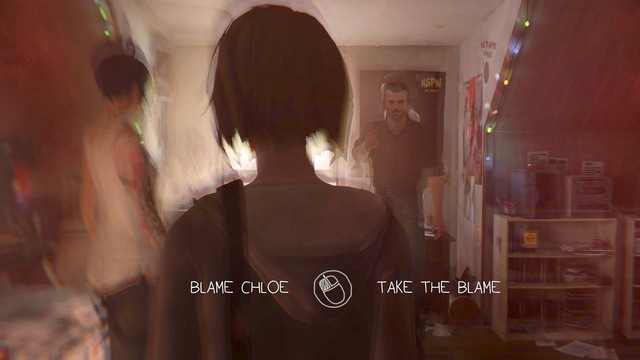Giving players the reins: on gaming narratives, choice of consequences and legos
Haley Uyrus looks at the current state of game narrative and the exciting future ahead -- focusing particularly on Ken Levine's in-game narrative legos, which would eventually lead to a seamless player-driven narrative.

I have to say, I do love a good narrative. In fact, stories and narrative are one of the major reasons I switched from my beginnings as a graphic designer into the games industry. There’s just not enough in traditional design -- but games… Games can have it all.
Narrative is the life and blood of any good storytelling, as in the traditional sense, it’s the sequence of events that make up a story, in a particular structure.
As a gamer, it’s easy to consume and immerse yourself in a game without ever contemplating how narratives are built into game development, but working in the games industry has shown me how much of a difficulty that can be, and in a way, games as a medium is still exploring more sophisticated ways to do this. It’s an exciting time for narrative exploration through games, and I’m very excited to see where it may lead, despite its challenges.
One of the particular difficulties is meshing the narrative with game mechanics. One of the ways we’ve seen this over the years is by creating choice driven games -- a popular theme, in heavily narrative driven games over the past few years. A few notable examples would be Dishonored, Lifeline, Life is Strange and the recent titles by Telltale Games.

There are also of course games that use the world building and environment more heavily (combined with game systems) to showcase the narrative - such as Left 4 Dead, The Witcher 3, and of course Fallout 4. But for the purpose of looking into the future of narrative as a whole, let’s stick to choice-driven narrative games, as we’ve seen their continued evolution in the potlight over the past few years.
In that context, it’s also important to consider that, as Warren Spector put it, “choices without consequences are meaningless.” Which is why games often receive a tremendous amount of negative feedback if the game hasn’t synced the mechanics and choice consequences well enough. In recent years, this ability to make the consequence feel real to the player has really gone through a lot of changes.

Taking a few key examples, in The Walking Dead (2012) - the emphasis is on a “time-sensitive decision-making system,” which forces players to make immediate choices from their gut. But Telltale also “made sure that system would provide no qualitative feedback on choices that players made, so [that] players had to think about and live with the decisions on their own.”
In The Walking Dead, your choices:
affect your player-character’s development
affect those around you and group mechanics
affect the situations you get in personally and as a group
Together, these combined consequences make the game feel like you’ve carved in your own story. Also, the stats at the end of each episode let you see the percentage of people that made each decision, which adds to the effect.

A more recent episodic, Life is Strange (2015) is an evolution on Telltale-style decision-making games, due to its ability to see the immediate consequences of your actions before you make your final decision -- thanks to its rewind mechanic. Your choices:
affect your player-character’s development
affect those around you
affect situations and the world around you
Alongside these changes, we’ve also seen more and more procedural generation and expansion. The increasingly sophisticated algorithms in the games area can create procedural narrative too:
"It's not just environments, either: in Rimworld, an ‘AI storyteller’ creates events and mini-narratives for the player; Moon Hunters uses the technique to create ‘myths’ -- in-world stories and art -- about the player's exploits; and in SkySaga: Infinite Isles, a role-playing game by UK-based Radiant Worlds, entire adventures are generated by algorithm.” - Wired
And then, there's Ken Levine's narrative legos. In 2013, he hinted that he was "playing around with a concept for a game that would allow people to create an AI-powered character and then impose feelings on it. Think of it as a super next-gen Tamagotchi." This thought experiment led Levine to look at narrative - and break it down into the smallest possible parts, in order to remix and build pieces to create different narratives.
The experiment could originally be seen with Elizabeth from BioShock Infinite's ability to suddenly yell "Hey Booker, catch" and throw the player some ammo or other helpful item. Ken Levine expanded on this at GDC.
Narrative legos, in short, are story elements that fit in and interact in many possible different ways with each other to trigger gameplay elements, without going through a specific fixed script. This way of developing games without imposing artificial boundaries on the player and instead giving them non-linear, replayable and player-driven narratives, creates a stronger emotional attachment for the player. It becomes their game, and each of their decision will impact gameplay in very deep ways. But we’ll have to wait and see what Levine has in mind.

Game narrative and storytelling have made major leaps forward in the past few years, as can be seen with Rhianna Prachett’s work on the Tomb Raider series, along with other powerful and impactful titles such as The Last of Us (Neil Druckmann), and This War of Mine, as well as many more. Now that consumers have proven to the industry that they are ready and waiting for more emotionally rich narrative experiences, we’re sure to see many different exciting directions come forward during the next few years.
Moving forward, I hope all of these advances allow us to bring narrative in games up to speed to other mediums like film, which will allow us to explore new topics and dilemmas, as well as deeper and more diverse characters. Games (and their ability to allow us to experience stories first-hand) hold a great power to open empathy, teach us things about ourselves and the world around us, and eventually, maybe, affect our lives.
Haley Uyrus is BeefJack's digital marketing specialist. Besides promoting indie games, she likes cats, TV shows with deadpan humor, and flavored coffee. Her all-time favorite games are Left4Dead, Bioshock 2, The Vanishing of Ethan Carter and The Wolf Among Us.
Follow her on twitter: @Absintheuse
About the Author
You May Also Like









